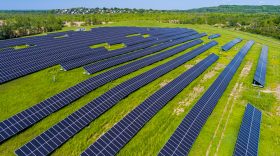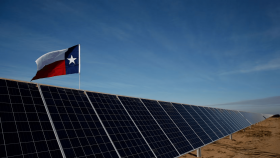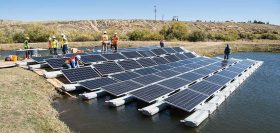Climate Change Action: Investment Decisions
One of the most important forms of free speech in the world is voting with your money. The companies and organizations you support, whether through products you purchase, donations you make, or investments you hold, carry an immense amount of weight in a capitalistic society. When it comes to ensuring that large companies, organizations, and even governments responsible, they are likely to respond most swiftly and completely to concerns (whether climate-related or otherwise) when it will affect their bottom line. As such, choosing deliberately and in an informed manner where you choose to keep your investments can be a great way to control your impact on fighting climate change. Where your money resides sends a message and can influence greater change than many other actions you may take on a day-to-day basis.
When it comes to making investment decisions in a way that informs climate action, the following are two of the main directions you can go:
Investing in Climate Positive Companies

What the action looks like: While voting in elections will directly impact leaders who make climate impactful policy, for better or worse, but many would argue that rather than waiting for sparse elections a more direct way to voice your views is to vote with your dollars. If you have an investment portfolio, you may opt to identify companies who are working to mitigate or prevent climate change through their business operations or even just through corporate social responsibility (CSR). Further, as an investor (no matter how small) in any publicly-traded company, you can make your voice heard and push for more climate-positive actions in shareholder meetings.
Example of the impact is: As one example highlighted by the United States Sustainable Investment Foundation (USSIF):
In 2009, a proposal from Trillium Asset Management asking Idacorp, an electric utility, to set greenhouse gas emission goals was supported by 51 percent of the shares voted, prompting the company to set a goal of reducing its carbon dioxide emissions intensity in the years 2010-2013 to 10–15 percent below the level in 2005. In its 2012 sustainability report, it reported that it had succeeded in reducing its carbon intensity 27 percent in 2012 from the 2005 level.
Level of difficulty: Medium—requires a person to have money to invest, the know-how on how to direct their investments, and the research into what companies would be most positive or what actions they should encourage as a shareholder.
Relevant quotes, stakeholders, and resources:
“I would encourage people first to get educated about your own money and the flow of where it’s going each month and quarter; learn and grasp what exactly is your portfolio (401k, 403b, IRA, etc) being invested in, as priority number one. Many people don’t have this basic knowledge. So, the first step is to get your house in order. Second, spend some time to understand what ESG [Environmental, social and governance] measures are. Many institutions and funds define, value, and measure ESG differently, so you need to take time to educate yourself on that if you want to have an investing orientation towards ESG. Call the experts, do your homework, and take those first baby steps. You don’t have to start out with much money off the bat, you can buy a small amount of an ESG oriented ETF or even just track stocks for a while for free–without investing a dime. No matter what you do, you should make a commitment to educate yourself before you invest a significant portion of your funds. Ultimately, ESG is not only about investing money it’s about driving real environmental, social and governance change.” —Dr. Michael K. Dorsey, Co-Founder & Treasurer of Sunrise Movement
“We believe that this wave of sustainable investment can deliver strong long-term returns because it is common sense that you would consider the ESG factors around any business model. This is not a trade-off of values for value.” – Lila Preston, co-head of the growth equity team at Generation Investment Management as quoted by Financial Times
“Divestment is an important symbol, but it’s symbolic. The oil and gas companies seem to be doing pretty well regardless of $6 trillion having been divested by various college funds and other endowments over the last several years.” – Richard Heede, Co-founder and co-director of the Climate Accountability Institute in Vox.com interview
Investing to Curb Climate Change: A Guide for the Individual Investor by USSIF
Divesting from Companies Harmful to the Climate

What the action looks like: Just as investing in climate positive companies can reinforce and support those public companies that are making the right steps when it comes to climate change, pulling your existing funds out of companies that aren’t taking those proactive steps is another way to let your wallet speak for you. As more individuals divest from companies that are shouldering a disproportionate load of climate responsibility without taking the necessary steps to move away from those carbon-emitting activities fast enough, it sends price signals and can be enough to influence change within said companies that would have more business reason to clean up their act than ever before.
What the impact is: The impact is more intangible with divestment, though a peer-reviewed article in the Sustainability journal notes:
Divestment seems to have imparted a need for action on finance and climate change in the finance world, where a discussion has developed around the pros and cons of divestment versus alternatives; this discussion is itself evidence of impact
Level of difficulty: Medium—requires a person to have money already invested in these companies in some way, the know-how on how to redirect their investments, and the research into what companies deserve divestment from your portfolio today.
Relevant quotes, stakeholders, and resources:
“In short: it just doesn’t make sense for individuals to hold stock in fossil fuel companies while understanding the consequence of climate change. The one thing we know the fossil fuel industry cares about is money. Collectively, we invest a lot of it. If you help to lead a personal divestment campaign focused on the stigmatization of these bad actors — weakening their political capital — we can help the momentum of climate solutions and sustainable economies. This was a key part of how the world ended the apartheid system in South Africa, and we hope it can have the same effect on the climate crisis.” – Statement on personal divestment from 350.org
“Divestment, to date, probably has reduced about zero tonnes of emissions. It’s not like you’ve capital-starved [the] people making steel and gasoline,” he said. “I don’t know the mechanism of action where divestment [keeps] emissions [from] going up every year. I’m just too damn numeric.” – Bill Gates, as quoted by Financial Times
Fossil Fuel Divestment & Reinvestment by USSIF
“A lot of people don’t realize how much they vote with their pension plans and savings accounts and wherever else their money may be. Doing some research into divesting funds out of fossil fuels and looking at 100% ESG sustainable investments, which are consistently beating benchmarks, is a huge step. Researching what one can do individually with what is in an investment portfolio and how much they may be supporting bad behavior, offers surprising results. It’s amazing the power most individuals don’t even realize they have.”– Valerie Mohl, Executive Director of Social Venture Circle
“Consumers should consider moving their money from banking and investments that fuel climate change to climate solutions. If you green your home, but bank and invest with companies that finance fossil fuels, you’re undermining your good work at home with your investments.” – Todd Larsen, Executive Co-Director for Consumer & Corporate Engagement at Green America
“The world is heating up at the rate of 400,000 Hiroshima-size bombs exploding every day. To have a chance to survive, we need to keep fossil fuels in the ground rather than burn them. Three important flows of money enable the destruction of the planet. First is the flow of our money to climate-bad banks as identified by the Rainforest Action Network’s annual report: Chase, Wells Fargo, Citibank, Bank of America and Union Bank. Our money in these banks helps them be profitable while they fund climate change. The second flow of money is from banks to the fossil fuel industry, which can’t continue its destructive activity without bank financing. Right now, stopping Enbridge’s Line 3 in Minnesota is top priority. Interrupting this second flow can have a big impact. The third flow of money is from those fossil fuel industries to politicians, which is what keeps government from rising to the occasion to protect us from devastating and shocking weather events like the recent freeze in Texas and Mississippi. It is by interrupting these three flows of money that individuals can have their biggest impact.”– Jim Thompson, This! Is What We Did
“Among the most important actions you can take, moving money out of fossil fuel funding banks is right near the top. Even if you live in an apartment and don’t have a roof to put solar panels on, your money can still fund solar being put on other people’s roofs. While your money is sitting and not being spent, banks lend your money out to build the world that we live in. We get to choose the world we want to live in by choosing where we bank.” – Ravi Mikkelsen, Co-Founder of Atmos Financial




